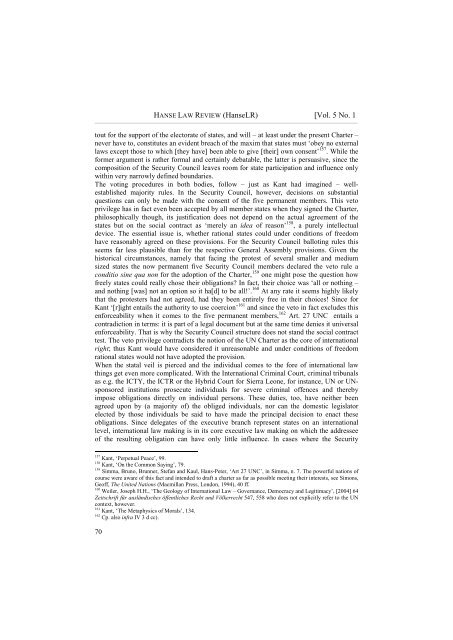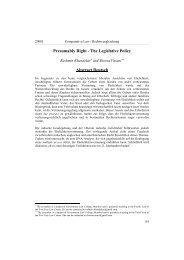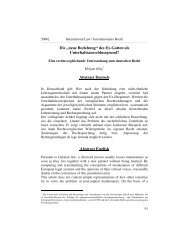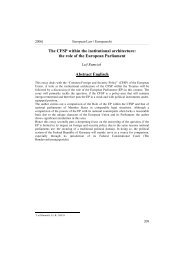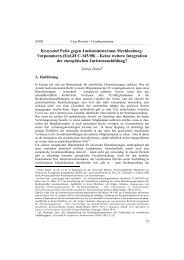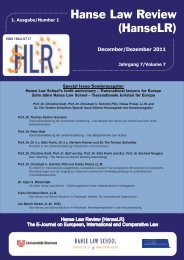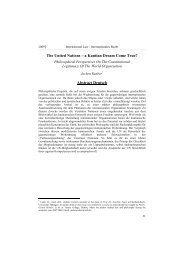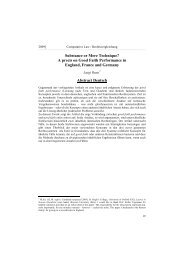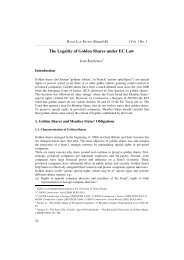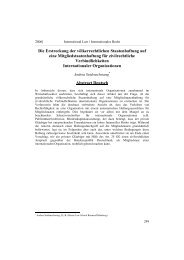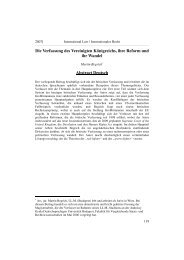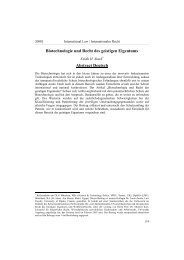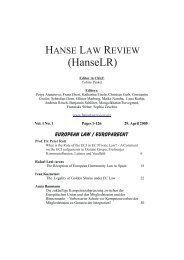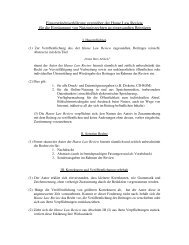The United Nations – a Kantian Dream Come True? - Hanse Law ...
The United Nations – a Kantian Dream Come True? - Hanse Law ...
The United Nations – a Kantian Dream Come True? - Hanse Law ...
Create successful ePaper yourself
Turn your PDF publications into a flip-book with our unique Google optimized e-Paper software.
HANSE LAW REVIEW (<strong>Hanse</strong>LR) [Vol. 5 No. 1<br />
___________________________________________________________________________________________________________________________________________________<br />
tout for the support of the electorate of states, and will <strong>–</strong> at least under the present Charter <strong>–</strong><br />
never have to, constitutes an evident breach of the maxim that states must ‘obey no external<br />
laws except those to which [they have] been able to give [their] own consent’ 157 . While the<br />
former argument is rather formal and certainly debatable, the latter is persuasive, since the<br />
composition of the Security Council leaves room for state participation and influence only<br />
within very narrowly defined boundaries.<br />
<strong>The</strong> voting procedures in both bodies, follow <strong>–</strong> just as Kant had imagined <strong>–</strong> wellestablished<br />
majority rules. In the Security Council, however, decisions on substantial<br />
questions can only be made with the consent of the five permanent members. This veto<br />
privilege has in fact even been accepted by all member states when they signed the Charter,<br />
philosophically though, its justification does not depend on the actual agreement of the<br />
states but on the social contract as ‘merely an idea of reason’ 158 , a purely intellectual<br />
device. <strong>The</strong> essential issue is, whether rational states could under conditions of freedom<br />
have reasonably agreed on these provisions. For the Security Council balloting rules this<br />
seems far less plausible than for the respective General Assembly provisions. Given the<br />
historical circumstances, namely that facing the protest of several smaller and medium<br />
sized states the now permanent five Security Council members declared the veto rule a<br />
conditio sine qua non for the adoption of the Charter, 159 one might pose the question how<br />
freely states could really chose their obligations? In fact, their choice was ‘all or nothing <strong>–</strong><br />
and nothing [was] not an option so it ha[d] to be all!’. 160 At any rate it seems highly likely<br />
that the protesters had not agreed, had they been entirely free in their choices! Since for<br />
Kant ‘[r]ight entails the authority to use coercion’ 161 and since the veto in fact excludes this<br />
enforceability when it comes to the five permanent members, 162 Art. 27 UNC entails a<br />
contradiction in terms: it is part of a legal document but at the same time denies it universal<br />
enforceability. That is why the Security Council structure does not stand the social contract<br />
test. <strong>The</strong> veto privilege contradicts the notion of the UN Charter as the core of international<br />
right; thus Kant would have considered it unreasonable and under conditions of freedom<br />
rational states would not have adopted the provision.<br />
When the statal veil is pierced and the individual comes to the fore of international law<br />
things get even more complicated. With the International Criminal Court, criminal tribunals<br />
as e.g. the ICTY, the ICTR or the Hybrid Court for Sierra Leone, for instance, UN or UNsponsored<br />
institutions prosecute individuals for severe criminal offences and thereby<br />
impose obligations directly on individual persons. <strong>The</strong>se duties, too, have neither been<br />
agreed upon by (a majority of) the obliged individuals, nor can the domestic legislator<br />
elected by those individuals be said to have made the principal decision to enact these<br />
obligations. Since delegates of the executive branch represent states on an international<br />
level, international law making is in its core executive law making on which the addressee<br />
of the resulting obligation can have only little influence. In cases where the Security<br />
157 Kant, ‘Perpetual Peace’, 99.<br />
158 Kant, ‘On the Common Saying’, 79.<br />
159 Simma, Bruno, Brunner, Stefan and Kaul, Hans-Peter, ‘Art 27 UNC’, in Simma, n. 7. <strong>The</strong> powerful nations of<br />
course were aware of this fact and intended to draft a charter as far as possible meeting their interests, see Simons,<br />
Geoff, <strong>The</strong> <strong>United</strong> <strong>Nations</strong> (Macmillan Press, London, 1994), 40 ff.<br />
160 Weiler, Joseph H.H., ‘<strong>The</strong> Geology of International <strong>Law</strong> <strong>–</strong> Governance, Democracy and Legitimacy’, [2004] 64<br />
Zeitschrift für ausländisches öffentliches Recht und Völkerrecht 547, 558 who does not explicitly refer to the UN<br />
context, however.<br />
161 Kant, ‘<strong>The</strong> Metaphysics of Morals’, 134.<br />
162 Cp. also infra IV 3 d cc).<br />
70


